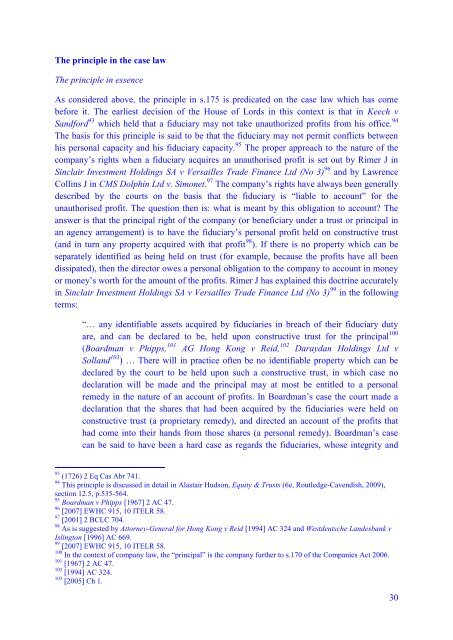Chapter 7 Directors' Duties - alastairhudson.com
Chapter 7 Directors' Duties - alastairhudson.com
Chapter 7 Directors' Duties - alastairhudson.com
Create successful ePaper yourself
Turn your PDF publications into a flip-book with our unique Google optimized e-Paper software.
The principle in the case law<br />
The principle in essence<br />
As considered above, the principle in s.175 is predicated on the case law which has <strong>com</strong>e<br />
before it. The earliest decision of the House of Lords in this context is that in Keech v<br />
Sandford 93 which held that a fiduciary may not take unauthorized profits from his office. 94<br />
The basis for this principle is said to be that the fiduciary may not permit conflicts between<br />
his personal capacity and his fiduciary capacity. 95 The proper approach to the nature of the<br />
<strong>com</strong>pany‟s rights when a fiduciary acquires an unauthorised profit is set out by Rimer J in<br />
Sinclair Investment Holdings SA v Versailles Trade Finance Ltd (No 3) 96 and by Lawrence<br />
Collins J in CMS Dolphin Ltd v. Simonet. 97 The <strong>com</strong>pany‟s rights have always been generally<br />
described by the courts on the basis that the fiduciary is “liable to account” for the<br />
unauthorised profit. The question then is: what is meant by this obligation to account? The<br />
answer is that the principal right of the <strong>com</strong>pany (or beneficiary under a trust or principal in<br />
an agency arrangement) is to have the fiduciary‟s personal profit held on constructive trust<br />
(and in turn any property acquired with that profit 98 ). If there is no property which can be<br />
separately identified as being held on trust (for example, because the profits have all been<br />
dissipated), then the director owes a personal obligation to the <strong>com</strong>pany to account in money<br />
or money‟s worth for the amount of the profits. Rimer J has explained this doctrine accurately<br />
in Sinclair Investment Holdings SA v Versailles Trade Finance Ltd (No 3) 99 in the following<br />
terms:<br />
“… any identifiable assets acquired by fiduciaries in breach of their fiduciary duty<br />
are, and can be declared to be, held upon constructive trust for the principal 100<br />
(Boardman v Phipps, 101 AG Hong Kong v Reid, 102 Daraydan Holdings Ltd v<br />
Solland 103 ) … There will in practice often be no identifiable property which can be<br />
declared by the court to be held upon such a constructive trust, in which case no<br />
declaration will be made and the principal may at most be entitled to a personal<br />
remedy in the nature of an account of profits. In Boardman‟s case the court made a<br />
declaration that the shares that had been acquired by the fiduciaries were held on<br />
constructive trust (a proprietary remedy), and directed an account of the profits that<br />
had <strong>com</strong>e into their hands from those shares (a personal remedy). Boardman‟s case<br />
can be said to have been a hard case as regards the fiduciaries, whose integrity and<br />
93 (1726) 2 Eq Cas Abr 741.<br />
94 This principle is discussed in detail in Alastair Hudson, Equity & Trusts (6e, Routledge-Cavendish, 2009),<br />
section 12.5, p.535-564.<br />
95 Boardman v Phipps [1967] 2 AC 47.<br />
96 [2007] EWHC 915, 10 ITELR 58.<br />
97 [2001] 2 BCLC 704.<br />
98 As is suggested by Attorney-General for Hong Kong v Reid [1994] AC 324 and Westdeutsche Landesbank v<br />
Islington [1996] AC 669.<br />
99 [2007] EWHC 915, 10 ITELR 58.<br />
100 In the context of <strong>com</strong>pany law, the “principal” is the <strong>com</strong>pany further to s.170 of the Companies Act 2006.<br />
101 [1967] 2 AC 47.<br />
102 [1994] AC 324.<br />
103 [2005] Ch 1.<br />
30













